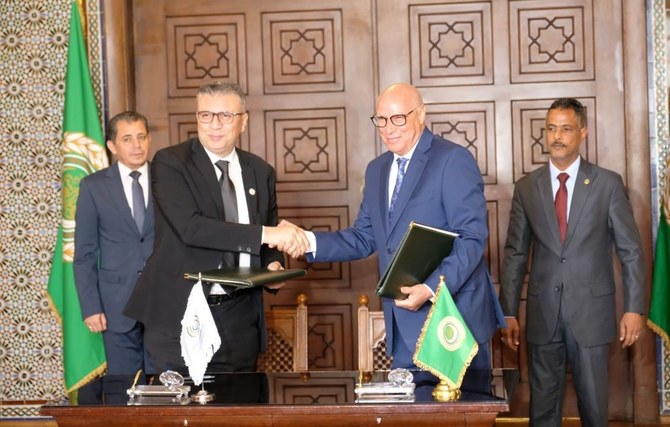WASHINGTON: Without speaking a word or scratching a pen across paper, President Joe Biden drove up the pressure on Big Tech companies already smarting under federal and congressional investigations, epic antitrust lawsuits and near-constant condemnation from politicians of both parties.
Biden last week elevated a fierce critic of Big Tech, antitrust legal scholar Lina Khan, to head the powerful Federal Trade Commission. The surprise move was a clear signal of a tough stance toward tech giants Facebook, Google, Amazon and Apple, and came as sweeping bipartisan legislation advanced in the House that could curb their market power and force them to sever their dominant platforms from their other lines of business.
The House Judiciary Committee is digging into the legislation in a public drafting session Wednesday, an initial step in what promises to be a strenuous slog through Congress. Many Republican lawmakers denounce the market dominance of Big Tech but don’t support a wholesale revamp of the antitrust laws. Republicans have relentlessly hurled accusations of anti-conservative bias against the social media platforms and may demand targeted legislative sanctions in return for their support.
The huge legislative package, led by industry critic Rep. David Cicilline, D-R.I., targets the companies’ structure and could point toward breaking them up, a dramatic step for Congress to take against a powerful industry whose products are woven into everyday life. If such steps were mandated, they could bring the biggest changes to the industry since the federal government’s landmark case against Microsoft some 20 years ago.
“It will be a really heavy lift,” says Rebecca Allensworth, a professor of antitrust at Vanderbilt University Law School. The complex language that could eventually be laid down may invite fights in the courts by rewriting four decades of antitrust case law, she suggested.
Lauded as engines of innovation, the Silicon Valley giants for decades enjoyed minimal regulation and star status in Washington, with a notable coziness during the Obama administration, when Biden was vice president. The industry’s fortunes abruptly reversed about two years ago, when the companies came under intense federal scrutiny, a searing congressional investigation, and growing public criticism over issues of competition, consumer privacy and hate speech.
Biden said as a presidential candidate that dismantling the big tech companies should be considered. He also has said he wants to see changes to the social media companies’ long-held legal protections for speech on their platforms.
The legislative proposals also would prohibit the tech giants from favoring their own products and services over competitors on their platforms. The legislation was informed by a 15-month Judiciary subcommittee antitrust investigation, led by Cicilline, that concluded the four tech giants have abused their market power by charging excessive fees, imposing tough contract terms and extracting valuable data from individuals and businesses that rely on them.
The four companies deny abusing their dominant market position and have asserted that improper intervention in the market through legislation would hurt small businesses and consumers.
The legislation also would make it tougher for the giant tech companies to snap up competitors in mergers, which they have completed by scores in recent years.
And the legislation asks Congress to boost the budgets of regulators who police competition, such as the Federal Trade Commission and the antitrust division of the Justice Department. State attorneys general would get power over companies to choose which courts to prosecute tech antitrust cases in. Some expert observers view those as the less complicated and less controversial parts of the legislation that may stand a better chance of making it to congressional passage.
Democrats control the House, but they would need to garner significant Republican support in the Senate for legislation to pass. The chamber is split 50-50 with the Democrats’ one-vote margin depending on Vice President Kamala Harris being the tiebreaker.
The tech industry has known that major antitrust legislation would likely follow the House investigation. And it was known for months that Biden was naming Lina Khan as one of five members of the FTC. But Silicon Valley — and nearly everyone inside the Beltway — was blindsided by Biden’s lightning move elevating Khan to head the independent agency. She was sworn in just hours after the Senate confirmed her as one of five commissioners on a 69-28 vote.
Khan, who has been a law professor at Columbia University, burst onto the antitrust scene with her weighty scholarly work in 2017 as a Yale law student, “Amazon’s Antitrust Paradox.” She helped lay the foundation for a new way of looking at antitrust law beyond the impact of big-company market dominance on consumer prices. As counsel to the Judiciary antitrust subcommittee, she played a key role in the 2019-20 investigation of the tech giants’ market power.
At 32, Khan is believed to be the youngest chair in the history of the FTC, which polices competition and consumer protection in industry generally as well as digital privacy.
Last October the Trump Justice Department, joined by about a dozen states, filed a ground-breaking antitrust lawsuit against Google, accusing the company of abusing its dominance in online search and advertising to stifle competition. That was followed in December by a big antitrust suit against Facebook, brought by the FTC and nearly every US state. It seeks remedies that could include a forced spinoff of the popular Instagram and WhatsApp messaging services.
European watchdogs, meanwhile, are stepping up their antitrust actions against the tech giants. In the latest move, word came Tuesday that European Union regulators have opened a new investigation into whether Google stifled competition in digital ad technology. The EU regulators have previously charged Apple with stifling competition in music streaming, and accused Amazon of using data from independent merchants to unfairly compete against them with its own products.
EU and British regulators recently opened dual antitrust probes into whether Facebook distorts competition in the classified advertising market by using data to unfairly compete against rival services.
From Biden to Congress, Big Tech is under mounting pressure
https://arab.news/vemg3
From Biden to Congress, Big Tech is under mounting pressure

- US President Joe Biden believes steps are needed to protect privacy, generate more innovation and deal with other problems created by big technology platforms.
- The huge legislative package from the House Judiciary Committee targets big tech companies’ structure and could point toward breaking them up.
Several Google employees fired, arrested after ‘Googlers Against Genocide’ sit-in protests

- Outrage over tech giant’s $1.2bn Project Nimbus contract with the Israeli military
- Affiliated group No Tech for Apartheid condemns decision as a flagrant act of retaliation
LONDON: A number of Google employees have lost their jobs and nine have been arrested following protests against the tech giant’s $1.2bn Project Nimbus contract with the Israeli military.
The demonstrations, organized by Googlers Against Genocide and associated with the group No Tech for Apartheid, involved a 10-hour sit-in at Google’s sites in New York City and Sunnyvale, California.
The protesters occupied the office of Google Cloud CEO Thomas Kurian in California, prompting police intervention.
“Physically impeding other employees’ work and preventing them from accessing our facilities is a clear violation of our policies and completely unacceptable behavior,” the company said in a statement.
It added the decision to terminate the employees’ contracts was taken following individual case investigations and that the company would continue to take action as necessary.
In a statement on Medium, Google workers affiliated with the No Tech for Apartheid campaign called the decision to terminate the 28 employees a “flagrant act of retaliation” and said staff members who did not directly participate in Tuesday’s protests were among those who lost their jobs.
“Despite Google’s attempts to silence us and disregard our concerns, we will persist,” said Jane Chung, spokesperson for the protesters.
Announced by Google and Amazon in 2021, Project Nimbus has faced criticism for providing advanced AI and machine-learning capabilities to Israel’s government.
Amid the ongoing conflict, No Tech for Apartheid launched a petition urging both companies to cancel the project, alleging complicity in Gaza’s ethnic cleansing.
Google’s statement said the Nimbus contract was “not directed at highly sensitive, classified or military workloads relevant to weapons or intelligence services.”
Sources have also indicated that both Google and Amazon are bound by stringent contractual obligations that prevent them yielding to boycott pressure, effectively trapping them in the current situation.
The protests come in the wake of allegations that Google is silencing pro-Palestinian voices.
One of the fired workers protested during a presentation by Google’s Israel managing director in New York City.
Employees have demanded that the company stop “the harassment, intimidation, bullying, silencing, and censorship of Palestinian, Arab, and Muslim Googlers.”
They have also demanded that Google address “health and safety issues” in the workplace, which arose from the “mental health consequences of working at a company that is using their labor to enable a genocide.”
Palestinian photojournalist Motaz Azaiza joins Time Magazine’s list of 100 most influential people

- Azaiza honored in “Icons” category for his work documenting the conflict in Gaza
LONDON: Palestinian photojournalist Motaz Azaiza has been named one of the “100 Most Influential People of 2024” by Time Magazine.
Azaiza was recognized in the “Icons” category for his work documenting the conflict in Gaza, with his photographs offering a rare insight into the realities faced by those living in the enclave.
“For 108 days, Motaz Azaiza acted as the world’s eyes and ears in his native Gaza. Armed with a camera and a flak jacket marked ‘Press,’ the 25-year-old Palestinian photographer spent nearly four months documenting life under Israeli bombardment,” the magazine’s entry description said.
Azaiza’s images offer a perspective rarely seen in international media, given Israel’s ban on foreign journalists entering Gaza.
The photographer took to social media after the announcement, saying the honor symbolizes more than just his individual achievements.
“I am really blessed to share my country name with me wherever I go or whatever I achieve,” he wrote on X.
The Palestinian Photographer..
— MoTaz (@azaizamotaz9) April 17, 2024
I am really blessed to share my country name with me wherever I go or whatever I achieve
For those who don’t recognize Palestine as a state, or for those who claim that it is their land.
Palestine gonna be free one day from Zionists and occupation.… https://t.co/1tqmxwahOP
During his time in Gaza, Azaiza captured images showing the destruction wrought by the conflict, and the resilience of its people.
His photographs, shared with over 18 million followers on Instagram, served as a crucial source of information, despite the risks involved.
Since leaving Gaza in January and relocating to Doha, Azaiza has continued to call for greater awareness of the crisis, and international intervention to halt the conflict.
“What is happening in Gaza is not content for you,” he was quoted as saying by the magazine. “We are not telling you what is happening … for your likes or views or shares. No, we are waiting for you to act. We need to stop this war.”
Since 1999, Time Magazine has published its annual Time 100 list, recognizing influential individuals in various fields.
Others who made this year’s list include singer Dua Lipa, Japanese animator Hayao Miyazaki, American footballer Patrick Mahomes, Formula One driver Max Verstappen and Qatar’s Prime Minister Mohammed bin Abdulrahman Al-Thani.
In November 2023, GQ Middle East named Azaiza as its Man of the Year, underscoring his role in inspiring positive change.
Azaiza’s nomination for the Time 100 list was submitted by Yasmeen Serhan, a staff writer at Time Magazine.
Gaza’s Mohammed Salem wins World Press Photo of the Year award with haunting image of woman cradling dead niece

- Picture was taken on Oct. 17, at Nasser hospital in southern Gaza, where families searched for relatives killed during Isralei bombing
- ‘I hope photo makes world more conscious of the human impact of war, especially on children,’ Salem said
AMSTERDAM: Reuters photographer Mohammed Salem won the prestigious 2024 World Press Photo of the Year award on Thursday for his image of a Palestinian woman cradling the body of her five-year-old niece in the Gaza Strip.
The picture was taken on Oct. 17, 2023, at Nasser hospital in Khan Younis in southern Gaza, where families were searching for relatives killed during Israeli bombing of the Palestinian enclave.
Salem’s winning image portrays Inas Abu Maamar, 36, sobbing while holding Saly’s sheet-clad body in the hospital morgue.
“Mohammed received the news of his WPP award with humility, saying that this is not a photo to celebrate but that he appreciates its recognition and the opportunity to publish it to a wider audience,” Reuters’ Global Editor for Pictures and Video, Rickey Rogers, said at a ceremony in Amsterdam.
“He hopes with this award that the world will become even more conscious of the human impact of war, especially on children,” Rogers said, standing in front of the photo at the Nieuwe Kerk in the Dutch capital.
Announcing its annual awards, the Amsterdam-based World Press Photo Foundation said it was important to recognize the dangers facing journalists covering conflicts.
It said 99 journalists and media employees had been killed covering the war between Israel and Hamas since the Palestinian militant group attacked southern Israel on Oct. 7 and Israel responded by launching a military offensive in Gaza.
“The work of press and documentary photographers around the world is often done at high risk,” said Joumana El Zein Khoury, the organization’s executive director.
“This past year, the death toll in Gaza pushed the number of journalists killed to a near-record high. It is important to recognize the trauma they have experienced to show the world the humanitarian impact of the war.”
Salem, a Palestinian aged 39, has worked for Reuters since 2003. He also won an award in the 2010 World Press Photo competition.
The jury said Salem’s 2024 winning image was “composed with care and respect, offering at once a metaphorical and literal glimpse into unimaginable loss.”
“I felt the picture sums up the broader sense of what was happening in the Gaza Strip,” Salem said when the image was first published in November.
“People were confused, running from one place to another, anxious to know the fate of their loved ones, and this woman caught my eye as she was holding the body of the little girl and refused to let go.”

’PROFOUNDLY AFFECTING’
Salem’s wife had given birth to their child days before he took the shot.
The photograph is “profoundly affecting,” said jury member Fiona Shields, head of photography at Guardian News & Media.
The jury selected the winning photos from 61,062 entries by 3,851 photographers from 130 countries.
GEO photographer Lee-Ann Olwage of South Africa won the story of the year category with images documenting dementia in Madagascar.
The long-term projects category was won by Alejandro Cegarra of Venezuela for the series “The Two Walls” for The New York Times/Bloomberg.
Ukrainian photographer Julia Kochetova won the open format award with “War is Personal,” which documented the war in her country by weaving together pictures, poetry, audio and music in documentary style.
Arab League, OIC Islamic Broadcasting Union sign media protocol

- Protocol encompasses various areas of collaboration, and focuses on training and capacity building in media and journalism
- Ambassador Ahmed Rashid Khattabi expressed optimism that the collaboration will contribute to promoting values of tolerance and moderation
CAIRO: The Arab League said that a media cooperation protocol will be signed between its Secretariat’s Media and Communication Sector and the OIC Islamic Broadcasting Union.
The Arab League added that “as part of efforts to cement ties between the General Secretariat of the League of Arab States and the Organization of Islamic Cooperation (OIC) Radio and Television Union, and in line with the General Secretariat’s commitment to fostering relations with regional and international organizations, a cooperation protocol will be signed between the General Secretariat’s Media and Communication Sector and the OIC Islamic Broadcasting Union.”
The protocol encompasses various areas of collaboration, and focuses on training and capacity building in media and journalism. It aims to bolster media exchange between the League of Arab States and the OIC, facilitate the sharing of expertise and knowledge in media practices, organize joint media initiatives, and conduct specialized training courses and workshops.
Ambassador Ahmed Rashid Khattabi, assistant secretary-general and head of the Media and Communication Sector, said that the protocol shows the commitment of both organizations to advancing professional cooperation.
He highlighted the importance of aligning with rapid technological advancements to meet the evolving needs of both entities.
Khattabi commended the significance of this protocol, stressing the vital role of intensified media cooperation between Arab and Islamic nations.
He expressed optimism that the collaboration will contribute to promoting values of tolerance and moderation, while rejecting extremism, and fostering deeper media and cultural exchanges.
The signing ceremony will take place at the headquarters of the General Secretariat of the League of Arab States in Cairo.
In response to the secretary-general’s directive, Khattabi will sign the cooperation protocol on behalf of the General Secretariat of the League of Arab States. Amr Ellissy, president of the OIC Radio and Television Union, will sign on behalf of the union.
Social media platform X blocked in Pakistan over national security, ministry says

- Ministry accuses X of failing to address its concerns, says ban was in ‘interest of upholding national security’
- X has been blocked since country election in February, with activities critizing ban aims to stifle democratic accountability
ISLAMABAD: Pakistan’s interior ministry said on Wednesday it had blocked access to social media platform X around the time of February’s election on national security concerns, confirming a long-suspected shutdown.
Users in Pakistan have reported problems using X, formerly known as Twitter, since mid-February, but the government had made no official announcement on the matter until now.
The interior ministry mentioned the shutdown in a written submission to Islamabad High Court on Wednesday. Another court has told the government to reconsider the ban within a week, said Abdul Moiz Jafri, a petitioner and advocate.
“It is very pertinent to mention here that the failure of Twitter/X to adhere to the lawful directives of the government of Pakistan and address concerns regarding the misuse of its platform necessitated the imposition of a ban,” the ministry said in its court submission, which was seen by Reuters.
It said X had been reluctant to resolve the issue. X did not immediately respond to a Reuters request for comment on Wednesday.
“The decision to impose a ban on Twitter/X in Pakistan was made in the interest of upholding national security, maintaining public order, and preserving the integrity of our nation,” the ministry report said.
Access to X has remained limited since the Feb. 8 national election, which the party of jailed former prime minister Imran Khan says was rigged.
KHAN’S PARTY IS BIG USER OF X
Among Pakistan’s political parties, Khan’s party is the most prolific user of social media platforms, particularly after the country’s traditional media began censoring news about the ex-cricket star and his party ahead of the polls. Khan has over 20 million followers on X, making him the most followed Pakistani.
Khan says Pakistan’s military was behind his ouster as prime minister in 2022 and that it helped his opponents form the current government, despite candidates backed by his party winning most seats in February’s election. The military denies this charge.
He remains in jail on a number of convictions, most of which came days before the election.
Many government officials in Pakistan, notably Prime Minister Shehbaz Sharif, continue to use X — most likely through VPN software that bypasses the blocks.
The decision to temporarily block X was taken after considering confidential reports from Pakistan’s intelligence and security agencies, the ministry report said.
It said “hostile elements operating on Twitter/X have nefarious intentions to create an environment of chaos and instability, with the ultimate goal of destabilising the country and plunging it into some form of anarchy.”
Rights groups and marketing advertisers have raised concerns.
Digital rights activist Usama Khilji said the block on X seemed designed to hinder the democratic accountability which he said a platform with instant updates of real-time information enables, especially amid the allegations and evidence of rigging which surfaced following the election.
Marketing consultant Saif Ali said: “It has become nearly impossible to convince Pakistani advertisers to invest in Twitter for brand communications, due to the platform being throttled by governmental authorities.”




















